Employee Engagement and Retention in the Hotel Industry: Marriott
VerifiedAdded on 2023/01/09
|10
|3110
|44
Report
AI Summary
This report examines employee engagement within the hotel industry, using Marriott International as a case study. It addresses challenges like unethical leadership and toxic workplace culture, highlighting both poor and good practices in the sector. The analysis covers erratic expectations, favoritism, and burnout as negative factors, while emphasizing clear expectations, motivation, and effective communication as positive strategies. The report delves into Marriott's corporate ethic strategy, focusing on ethical standards, committee, awareness, monitoring, actions, and culture to ensure lifelong employment sustainability. Finally, it suggests implementing participative leadership, regular training, and effective communication channels to develop a workforce with skills and attitudes conducive to lifelong employment. The report emphasizes the importance of employee engagement for retention and overall success in the hospitality sector.
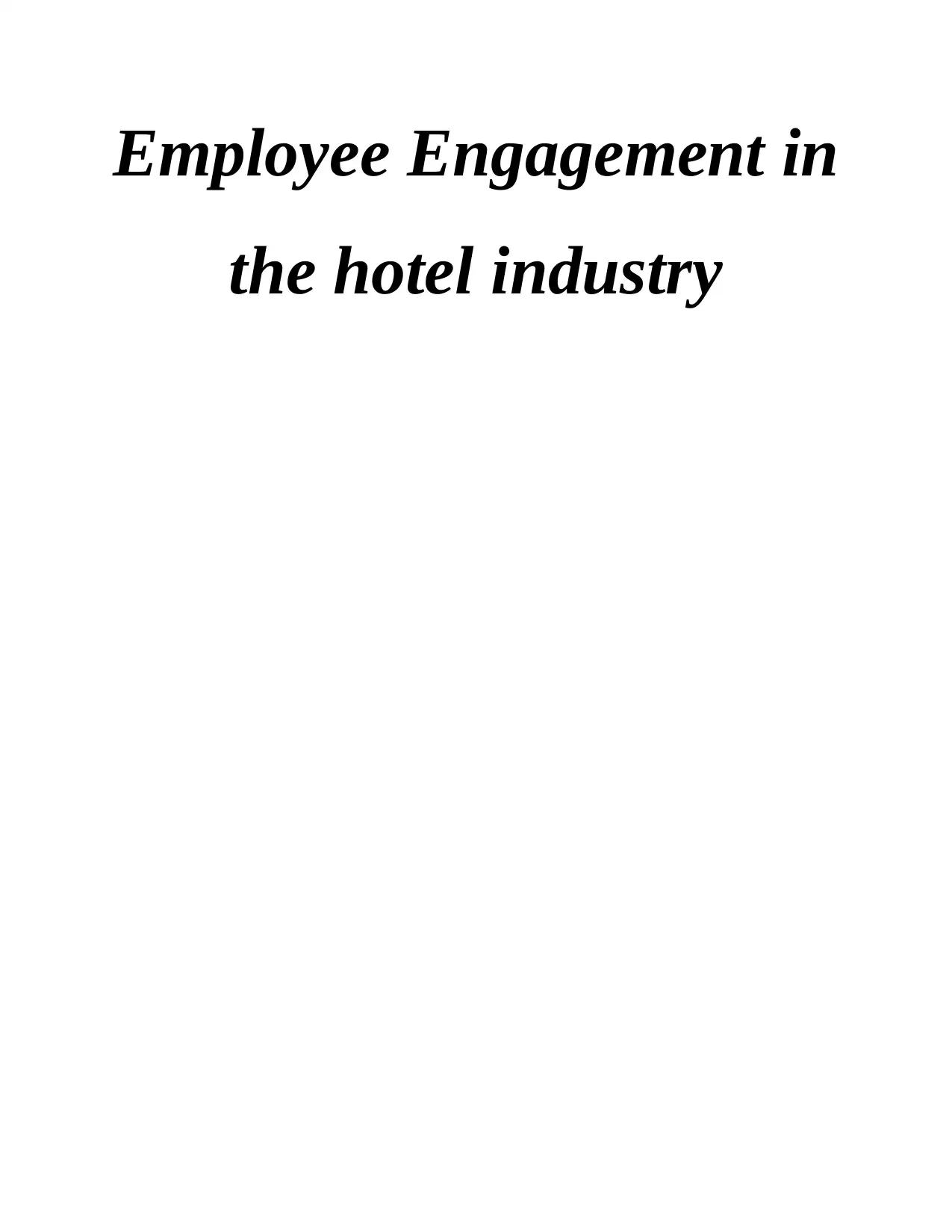
Employee Engagement in
the hotel industry
the hotel industry
Paraphrase This Document
Need a fresh take? Get an instant paraphrase of this document with our AI Paraphraser
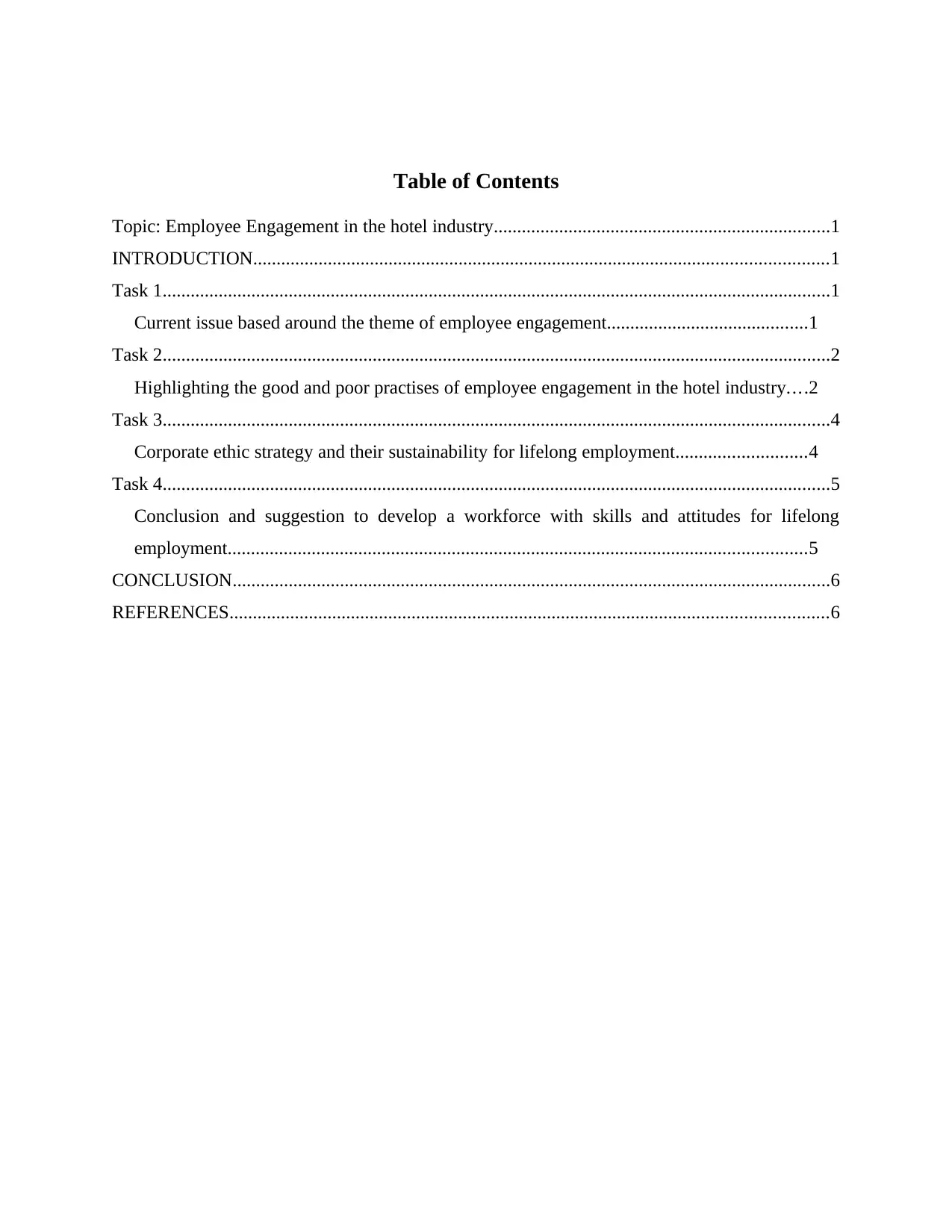
Table of Contents
Topic: Employee Engagement in the hotel industry........................................................................1
INTRODUCTION...........................................................................................................................1
Task 1...............................................................................................................................................1
Current issue based around the theme of employee engagement...........................................1
Task 2...............................................................................................................................................2
Highlighting the good and poor practises of employee engagement in the hotel industry....2
Task 3...............................................................................................................................................4
Corporate ethic strategy and their sustainability for lifelong employment............................4
Task 4...............................................................................................................................................5
Conclusion and suggestion to develop a workforce with skills and attitudes for lifelong
employment............................................................................................................................5
CONCLUSION................................................................................................................................6
REFERENCES................................................................................................................................6
Topic: Employee Engagement in the hotel industry........................................................................1
INTRODUCTION...........................................................................................................................1
Task 1...............................................................................................................................................1
Current issue based around the theme of employee engagement...........................................1
Task 2...............................................................................................................................................2
Highlighting the good and poor practises of employee engagement in the hotel industry....2
Task 3...............................................................................................................................................4
Corporate ethic strategy and their sustainability for lifelong employment............................4
Task 4...............................................................................................................................................5
Conclusion and suggestion to develop a workforce with skills and attitudes for lifelong
employment............................................................................................................................5
CONCLUSION................................................................................................................................6
REFERENCES................................................................................................................................6
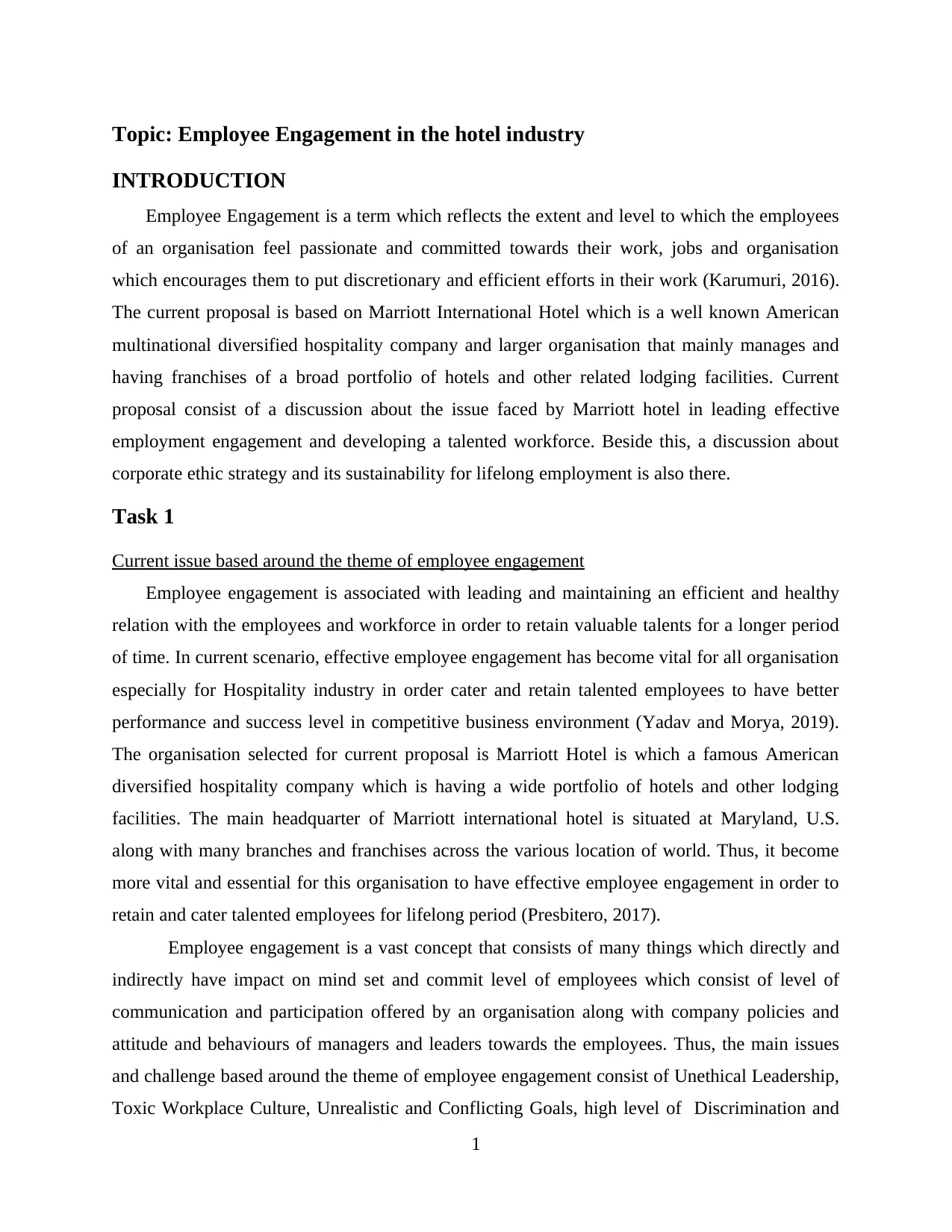
Topic: Employee Engagement in the hotel industry
INTRODUCTION
Employee Engagement is a term which reflects the extent and level to which the employees
of an organisation feel passionate and committed towards their work, jobs and organisation
which encourages them to put discretionary and efficient efforts in their work (Karumuri, 2016).
The current proposal is based on Marriott International Hotel which is a well known American
multinational diversified hospitality company and larger organisation that mainly manages and
having franchises of a broad portfolio of hotels and other related lodging facilities. Current
proposal consist of a discussion about the issue faced by Marriott hotel in leading effective
employment engagement and developing a talented workforce. Beside this, a discussion about
corporate ethic strategy and its sustainability for lifelong employment is also there.
Task 1
Current issue based around the theme of employee engagement
Employee engagement is associated with leading and maintaining an efficient and healthy
relation with the employees and workforce in order to retain valuable talents for a longer period
of time. In current scenario, effective employee engagement has become vital for all organisation
especially for Hospitality industry in order cater and retain talented employees to have better
performance and success level in competitive business environment (Yadav and Morya, 2019).
The organisation selected for current proposal is Marriott Hotel is which a famous American
diversified hospitality company which is having a wide portfolio of hotels and other lodging
facilities. The main headquarter of Marriott international hotel is situated at Maryland, U.S.
along with many branches and franchises across the various location of world. Thus, it become
more vital and essential for this organisation to have effective employee engagement in order to
retain and cater talented employees for lifelong period (Presbitero, 2017).
Employee engagement is a vast concept that consists of many things which directly and
indirectly have impact on mind set and commit level of employees which consist of level of
communication and participation offered by an organisation along with company policies and
attitude and behaviours of managers and leaders towards the employees. Thus, the main issues
and challenge based around the theme of employee engagement consist of Unethical Leadership,
Toxic Workplace Culture, Unrealistic and Conflicting Goals, high level of Discrimination and
1
INTRODUCTION
Employee Engagement is a term which reflects the extent and level to which the employees
of an organisation feel passionate and committed towards their work, jobs and organisation
which encourages them to put discretionary and efficient efforts in their work (Karumuri, 2016).
The current proposal is based on Marriott International Hotel which is a well known American
multinational diversified hospitality company and larger organisation that mainly manages and
having franchises of a broad portfolio of hotels and other related lodging facilities. Current
proposal consist of a discussion about the issue faced by Marriott hotel in leading effective
employment engagement and developing a talented workforce. Beside this, a discussion about
corporate ethic strategy and its sustainability for lifelong employment is also there.
Task 1
Current issue based around the theme of employee engagement
Employee engagement is associated with leading and maintaining an efficient and healthy
relation with the employees and workforce in order to retain valuable talents for a longer period
of time. In current scenario, effective employee engagement has become vital for all organisation
especially for Hospitality industry in order cater and retain talented employees to have better
performance and success level in competitive business environment (Yadav and Morya, 2019).
The organisation selected for current proposal is Marriott Hotel is which a famous American
diversified hospitality company which is having a wide portfolio of hotels and other lodging
facilities. The main headquarter of Marriott international hotel is situated at Maryland, U.S.
along with many branches and franchises across the various location of world. Thus, it become
more vital and essential for this organisation to have effective employee engagement in order to
retain and cater talented employees for lifelong period (Presbitero, 2017).
Employee engagement is a vast concept that consists of many things which directly and
indirectly have impact on mind set and commit level of employees which consist of level of
communication and participation offered by an organisation along with company policies and
attitude and behaviours of managers and leaders towards the employees. Thus, the main issues
and challenge based around the theme of employee engagement consist of Unethical Leadership,
Toxic Workplace Culture, Unrealistic and Conflicting Goals, high level of Discrimination and
1
⊘ This is a preview!⊘
Do you want full access?
Subscribe today to unlock all pages.

Trusted by 1+ million students worldwide
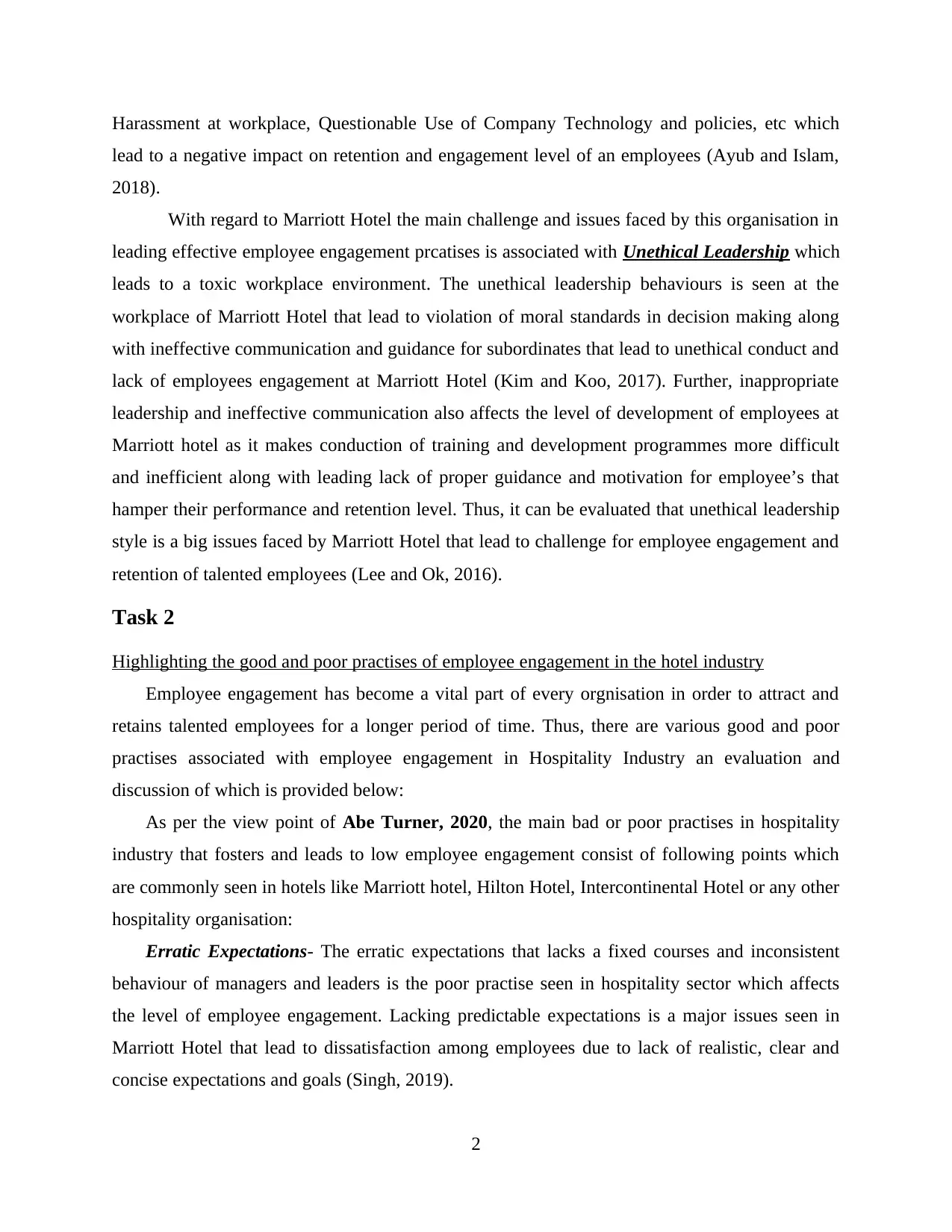
Harassment at workplace, Questionable Use of Company Technology and policies, etc which
lead to a negative impact on retention and engagement level of an employees (Ayub and Islam,
2018).
With regard to Marriott Hotel the main challenge and issues faced by this organisation in
leading effective employee engagement prcatises is associated with Unethical Leadership which
leads to a toxic workplace environment. The unethical leadership behaviours is seen at the
workplace of Marriott Hotel that lead to violation of moral standards in decision making along
with ineffective communication and guidance for subordinates that lead to unethical conduct and
lack of employees engagement at Marriott Hotel (Kim and Koo, 2017). Further, inappropriate
leadership and ineffective communication also affects the level of development of employees at
Marriott hotel as it makes conduction of training and development programmes more difficult
and inefficient along with leading lack of proper guidance and motivation for employee’s that
hamper their performance and retention level. Thus, it can be evaluated that unethical leadership
style is a big issues faced by Marriott Hotel that lead to challenge for employee engagement and
retention of talented employees (Lee and Ok, 2016).
Task 2
Highlighting the good and poor practises of employee engagement in the hotel industry
Employee engagement has become a vital part of every orgnisation in order to attract and
retains talented employees for a longer period of time. Thus, there are various good and poor
practises associated with employee engagement in Hospitality Industry an evaluation and
discussion of which is provided below:
As per the view point of Abe Turner, 2020, the main bad or poor practises in hospitality
industry that fosters and leads to low employee engagement consist of following points which
are commonly seen in hotels like Marriott hotel, Hilton Hotel, Intercontinental Hotel or any other
hospitality organisation:
Erratic Expectations- The erratic expectations that lacks a fixed courses and inconsistent
behaviour of managers and leaders is the poor practise seen in hospitality sector which affects
the level of employee engagement. Lacking predictable expectations is a major issues seen in
Marriott Hotel that lead to dissatisfaction among employees due to lack of realistic, clear and
concise expectations and goals (Singh, 2019).
2
lead to a negative impact on retention and engagement level of an employees (Ayub and Islam,
2018).
With regard to Marriott Hotel the main challenge and issues faced by this organisation in
leading effective employee engagement prcatises is associated with Unethical Leadership which
leads to a toxic workplace environment. The unethical leadership behaviours is seen at the
workplace of Marriott Hotel that lead to violation of moral standards in decision making along
with ineffective communication and guidance for subordinates that lead to unethical conduct and
lack of employees engagement at Marriott Hotel (Kim and Koo, 2017). Further, inappropriate
leadership and ineffective communication also affects the level of development of employees at
Marriott hotel as it makes conduction of training and development programmes more difficult
and inefficient along with leading lack of proper guidance and motivation for employee’s that
hamper their performance and retention level. Thus, it can be evaluated that unethical leadership
style is a big issues faced by Marriott Hotel that lead to challenge for employee engagement and
retention of talented employees (Lee and Ok, 2016).
Task 2
Highlighting the good and poor practises of employee engagement in the hotel industry
Employee engagement has become a vital part of every orgnisation in order to attract and
retains talented employees for a longer period of time. Thus, there are various good and poor
practises associated with employee engagement in Hospitality Industry an evaluation and
discussion of which is provided below:
As per the view point of Abe Turner, 2020, the main bad or poor practises in hospitality
industry that fosters and leads to low employee engagement consist of following points which
are commonly seen in hotels like Marriott hotel, Hilton Hotel, Intercontinental Hotel or any other
hospitality organisation:
Erratic Expectations- The erratic expectations that lacks a fixed courses and inconsistent
behaviour of managers and leaders is the poor practise seen in hospitality sector which affects
the level of employee engagement. Lacking predictable expectations is a major issues seen in
Marriott Hotel that lead to dissatisfaction among employees due to lack of realistic, clear and
concise expectations and goals (Singh, 2019).
2
Paraphrase This Document
Need a fresh take? Get an instant paraphrase of this document with our AI Paraphraser
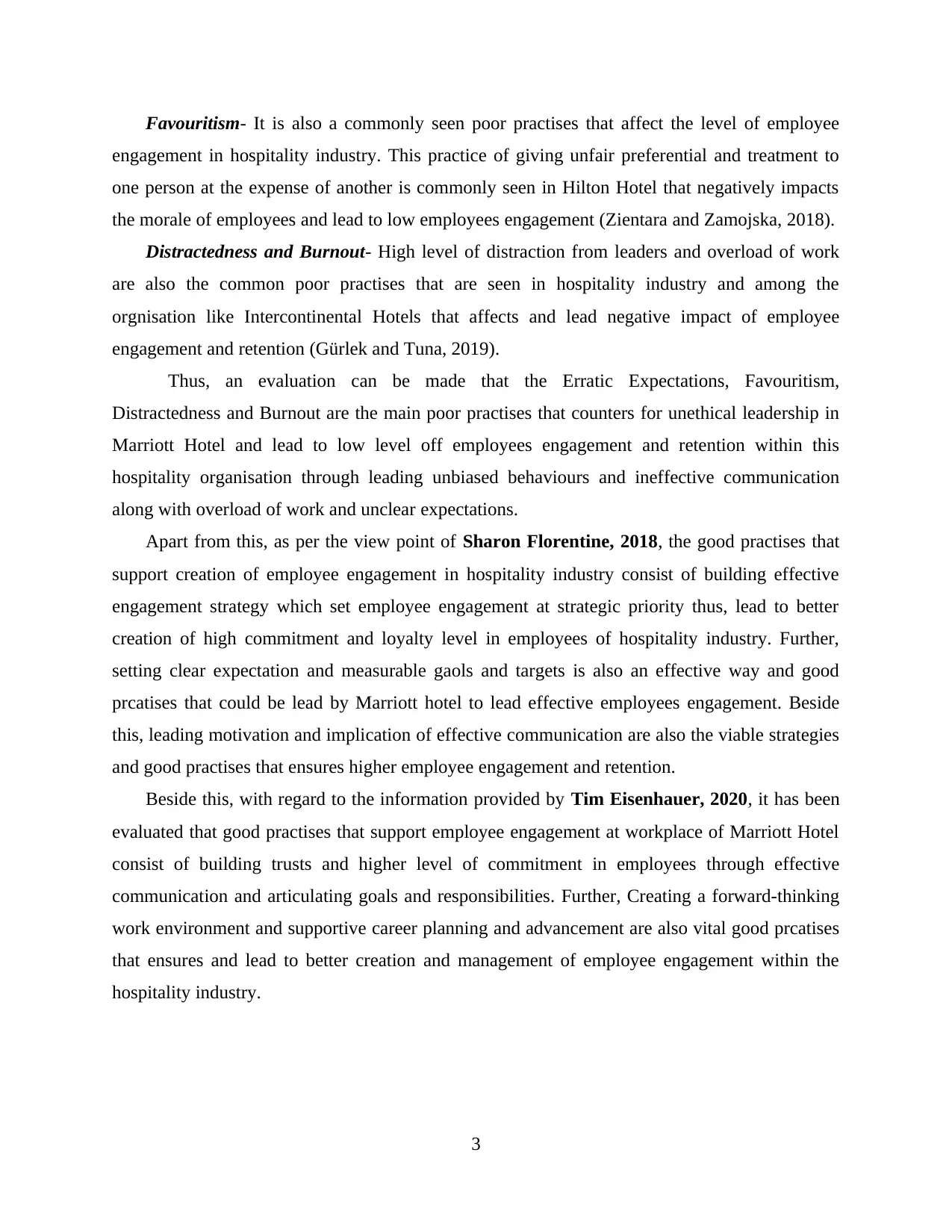
Favouritism- It is also a commonly seen poor practises that affect the level of employee
engagement in hospitality industry. This practice of giving unfair preferential and treatment to
one person at the expense of another is commonly seen in Hilton Hotel that negatively impacts
the morale of employees and lead to low employees engagement (Zientara and Zamojska, 2018).
Distractedness and Burnout- High level of distraction from leaders and overload of work
are also the common poor practises that are seen in hospitality industry and among the
orgnisation like Intercontinental Hotels that affects and lead negative impact of employee
engagement and retention (Gürlek and Tuna, 2019).
Thus, an evaluation can be made that the Erratic Expectations, Favouritism,
Distractedness and Burnout are the main poor practises that counters for unethical leadership in
Marriott Hotel and lead to low level off employees engagement and retention within this
hospitality organisation through leading unbiased behaviours and ineffective communication
along with overload of work and unclear expectations.
Apart from this, as per the view point of Sharon Florentine, 2018, the good practises that
support creation of employee engagement in hospitality industry consist of building effective
engagement strategy which set employee engagement at strategic priority thus, lead to better
creation of high commitment and loyalty level in employees of hospitality industry. Further,
setting clear expectation and measurable gaols and targets is also an effective way and good
prcatises that could be lead by Marriott hotel to lead effective employees engagement. Beside
this, leading motivation and implication of effective communication are also the viable strategies
and good practises that ensures higher employee engagement and retention.
Beside this, with regard to the information provided by Tim Eisenhauer, 2020, it has been
evaluated that good practises that support employee engagement at workplace of Marriott Hotel
consist of building trusts and higher level of commitment in employees through effective
communication and articulating goals and responsibilities. Further, Creating a forward-thinking
work environment and supportive career planning and advancement are also vital good prcatises
that ensures and lead to better creation and management of employee engagement within the
hospitality industry.
3
engagement in hospitality industry. This practice of giving unfair preferential and treatment to
one person at the expense of another is commonly seen in Hilton Hotel that negatively impacts
the morale of employees and lead to low employees engagement (Zientara and Zamojska, 2018).
Distractedness and Burnout- High level of distraction from leaders and overload of work
are also the common poor practises that are seen in hospitality industry and among the
orgnisation like Intercontinental Hotels that affects and lead negative impact of employee
engagement and retention (Gürlek and Tuna, 2019).
Thus, an evaluation can be made that the Erratic Expectations, Favouritism,
Distractedness and Burnout are the main poor practises that counters for unethical leadership in
Marriott Hotel and lead to low level off employees engagement and retention within this
hospitality organisation through leading unbiased behaviours and ineffective communication
along with overload of work and unclear expectations.
Apart from this, as per the view point of Sharon Florentine, 2018, the good practises that
support creation of employee engagement in hospitality industry consist of building effective
engagement strategy which set employee engagement at strategic priority thus, lead to better
creation of high commitment and loyalty level in employees of hospitality industry. Further,
setting clear expectation and measurable gaols and targets is also an effective way and good
prcatises that could be lead by Marriott hotel to lead effective employees engagement. Beside
this, leading motivation and implication of effective communication are also the viable strategies
and good practises that ensures higher employee engagement and retention.
Beside this, with regard to the information provided by Tim Eisenhauer, 2020, it has been
evaluated that good practises that support employee engagement at workplace of Marriott Hotel
consist of building trusts and higher level of commitment in employees through effective
communication and articulating goals and responsibilities. Further, Creating a forward-thinking
work environment and supportive career planning and advancement are also vital good prcatises
that ensures and lead to better creation and management of employee engagement within the
hospitality industry.
3
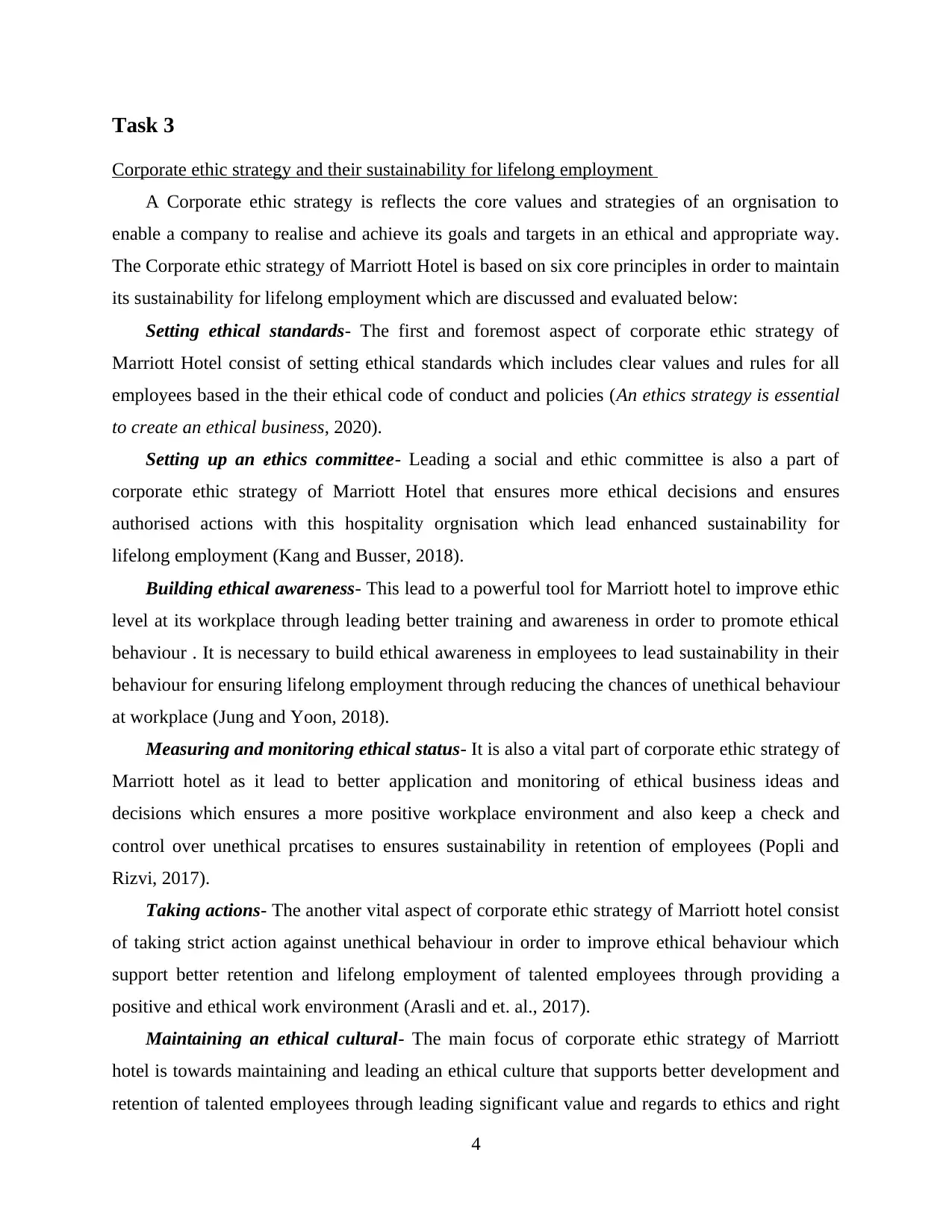
Task 3
Corporate ethic strategy and their sustainability for lifelong employment
A Corporate ethic strategy is reflects the core values and strategies of an orgnisation to
enable a company to realise and achieve its goals and targets in an ethical and appropriate way.
The Corporate ethic strategy of Marriott Hotel is based on six core principles in order to maintain
its sustainability for lifelong employment which are discussed and evaluated below:
Setting ethical standards- The first and foremost aspect of corporate ethic strategy of
Marriott Hotel consist of setting ethical standards which includes clear values and rules for all
employees based in the their ethical code of conduct and policies (An ethics strategy is essential
to create an ethical business, 2020).
Setting up an ethics committee- Leading a social and ethic committee is also a part of
corporate ethic strategy of Marriott Hotel that ensures more ethical decisions and ensures
authorised actions with this hospitality orgnisation which lead enhanced sustainability for
lifelong employment (Kang and Busser, 2018).
Building ethical awareness- This lead to a powerful tool for Marriott hotel to improve ethic
level at its workplace through leading better training and awareness in order to promote ethical
behaviour . It is necessary to build ethical awareness in employees to lead sustainability in their
behaviour for ensuring lifelong employment through reducing the chances of unethical behaviour
at workplace (Jung and Yoon, 2018).
Measuring and monitoring ethical status- It is also a vital part of corporate ethic strategy of
Marriott hotel as it lead to better application and monitoring of ethical business ideas and
decisions which ensures a more positive workplace environment and also keep a check and
control over unethical prcatises to ensures sustainability in retention of employees (Popli and
Rizvi, 2017).
Taking actions- The another vital aspect of corporate ethic strategy of Marriott hotel consist
of taking strict action against unethical behaviour in order to improve ethical behaviour which
support better retention and lifelong employment of talented employees through providing a
positive and ethical work environment (Arasli and et. al., 2017).
Maintaining an ethical cultural- The main focus of corporate ethic strategy of Marriott
hotel is towards maintaining and leading an ethical culture that supports better development and
retention of talented employees through leading significant value and regards to ethics and right
4
Corporate ethic strategy and their sustainability for lifelong employment
A Corporate ethic strategy is reflects the core values and strategies of an orgnisation to
enable a company to realise and achieve its goals and targets in an ethical and appropriate way.
The Corporate ethic strategy of Marriott Hotel is based on six core principles in order to maintain
its sustainability for lifelong employment which are discussed and evaluated below:
Setting ethical standards- The first and foremost aspect of corporate ethic strategy of
Marriott Hotel consist of setting ethical standards which includes clear values and rules for all
employees based in the their ethical code of conduct and policies (An ethics strategy is essential
to create an ethical business, 2020).
Setting up an ethics committee- Leading a social and ethic committee is also a part of
corporate ethic strategy of Marriott Hotel that ensures more ethical decisions and ensures
authorised actions with this hospitality orgnisation which lead enhanced sustainability for
lifelong employment (Kang and Busser, 2018).
Building ethical awareness- This lead to a powerful tool for Marriott hotel to improve ethic
level at its workplace through leading better training and awareness in order to promote ethical
behaviour . It is necessary to build ethical awareness in employees to lead sustainability in their
behaviour for ensuring lifelong employment through reducing the chances of unethical behaviour
at workplace (Jung and Yoon, 2018).
Measuring and monitoring ethical status- It is also a vital part of corporate ethic strategy of
Marriott hotel as it lead to better application and monitoring of ethical business ideas and
decisions which ensures a more positive workplace environment and also keep a check and
control over unethical prcatises to ensures sustainability in retention of employees (Popli and
Rizvi, 2017).
Taking actions- The another vital aspect of corporate ethic strategy of Marriott hotel consist
of taking strict action against unethical behaviour in order to improve ethical behaviour which
support better retention and lifelong employment of talented employees through providing a
positive and ethical work environment (Arasli and et. al., 2017).
Maintaining an ethical cultural- The main focus of corporate ethic strategy of Marriott
hotel is towards maintaining and leading an ethical culture that supports better development and
retention of talented employees through leading significant value and regards to ethics and right
4
⊘ This is a preview!⊘
Do you want full access?
Subscribe today to unlock all pages.

Trusted by 1+ million students worldwide
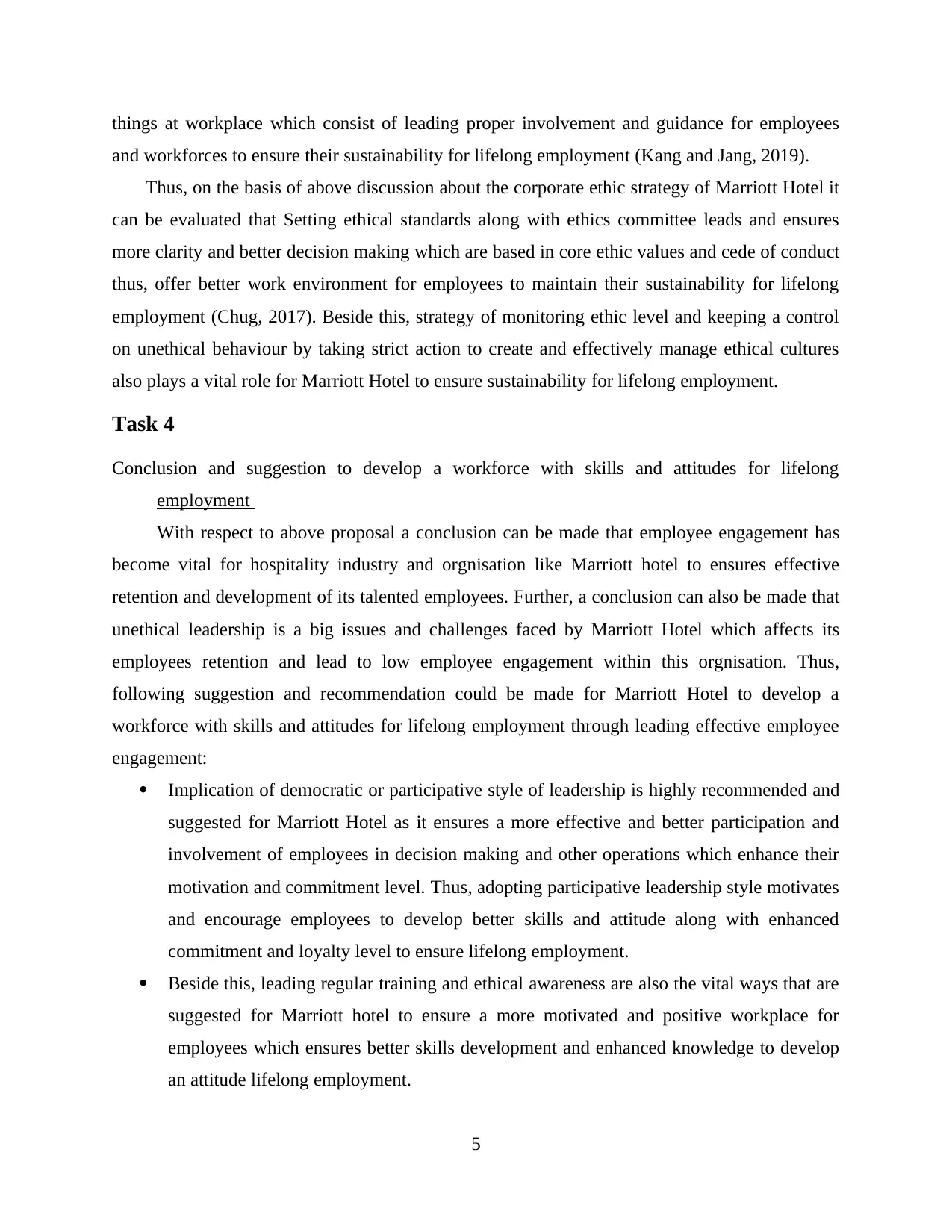
things at workplace which consist of leading proper involvement and guidance for employees
and workforces to ensure their sustainability for lifelong employment (Kang and Jang, 2019).
Thus, on the basis of above discussion about the corporate ethic strategy of Marriott Hotel it
can be evaluated that Setting ethical standards along with ethics committee leads and ensures
more clarity and better decision making which are based in core ethic values and cede of conduct
thus, offer better work environment for employees to maintain their sustainability for lifelong
employment (Chug, 2017). Beside this, strategy of monitoring ethic level and keeping a control
on unethical behaviour by taking strict action to create and effectively manage ethical cultures
also plays a vital role for Marriott Hotel to ensure sustainability for lifelong employment.
Task 4
Conclusion and suggestion to develop a workforce with skills and attitudes for lifelong
employment
With respect to above proposal a conclusion can be made that employee engagement has
become vital for hospitality industry and orgnisation like Marriott hotel to ensures effective
retention and development of its talented employees. Further, a conclusion can also be made that
unethical leadership is a big issues and challenges faced by Marriott Hotel which affects its
employees retention and lead to low employee engagement within this orgnisation. Thus,
following suggestion and recommendation could be made for Marriott Hotel to develop a
workforce with skills and attitudes for lifelong employment through leading effective employee
engagement:
Implication of democratic or participative style of leadership is highly recommended and
suggested for Marriott Hotel as it ensures a more effective and better participation and
involvement of employees in decision making and other operations which enhance their
motivation and commitment level. Thus, adopting participative leadership style motivates
and encourage employees to develop better skills and attitude along with enhanced
commitment and loyalty level to ensure lifelong employment.
Beside this, leading regular training and ethical awareness are also the vital ways that are
suggested for Marriott hotel to ensure a more motivated and positive workplace for
employees which ensures better skills development and enhanced knowledge to develop
an attitude lifelong employment.
5
and workforces to ensure their sustainability for lifelong employment (Kang and Jang, 2019).
Thus, on the basis of above discussion about the corporate ethic strategy of Marriott Hotel it
can be evaluated that Setting ethical standards along with ethics committee leads and ensures
more clarity and better decision making which are based in core ethic values and cede of conduct
thus, offer better work environment for employees to maintain their sustainability for lifelong
employment (Chug, 2017). Beside this, strategy of monitoring ethic level and keeping a control
on unethical behaviour by taking strict action to create and effectively manage ethical cultures
also plays a vital role for Marriott Hotel to ensure sustainability for lifelong employment.
Task 4
Conclusion and suggestion to develop a workforce with skills and attitudes for lifelong
employment
With respect to above proposal a conclusion can be made that employee engagement has
become vital for hospitality industry and orgnisation like Marriott hotel to ensures effective
retention and development of its talented employees. Further, a conclusion can also be made that
unethical leadership is a big issues and challenges faced by Marriott Hotel which affects its
employees retention and lead to low employee engagement within this orgnisation. Thus,
following suggestion and recommendation could be made for Marriott Hotel to develop a
workforce with skills and attitudes for lifelong employment through leading effective employee
engagement:
Implication of democratic or participative style of leadership is highly recommended and
suggested for Marriott Hotel as it ensures a more effective and better participation and
involvement of employees in decision making and other operations which enhance their
motivation and commitment level. Thus, adopting participative leadership style motivates
and encourage employees to develop better skills and attitude along with enhanced
commitment and loyalty level to ensure lifelong employment.
Beside this, leading regular training and ethical awareness are also the vital ways that are
suggested for Marriott hotel to ensure a more motivated and positive workplace for
employees which ensures better skills development and enhanced knowledge to develop
an attitude lifelong employment.
5
Paraphrase This Document
Need a fresh take? Get an instant paraphrase of this document with our AI Paraphraser
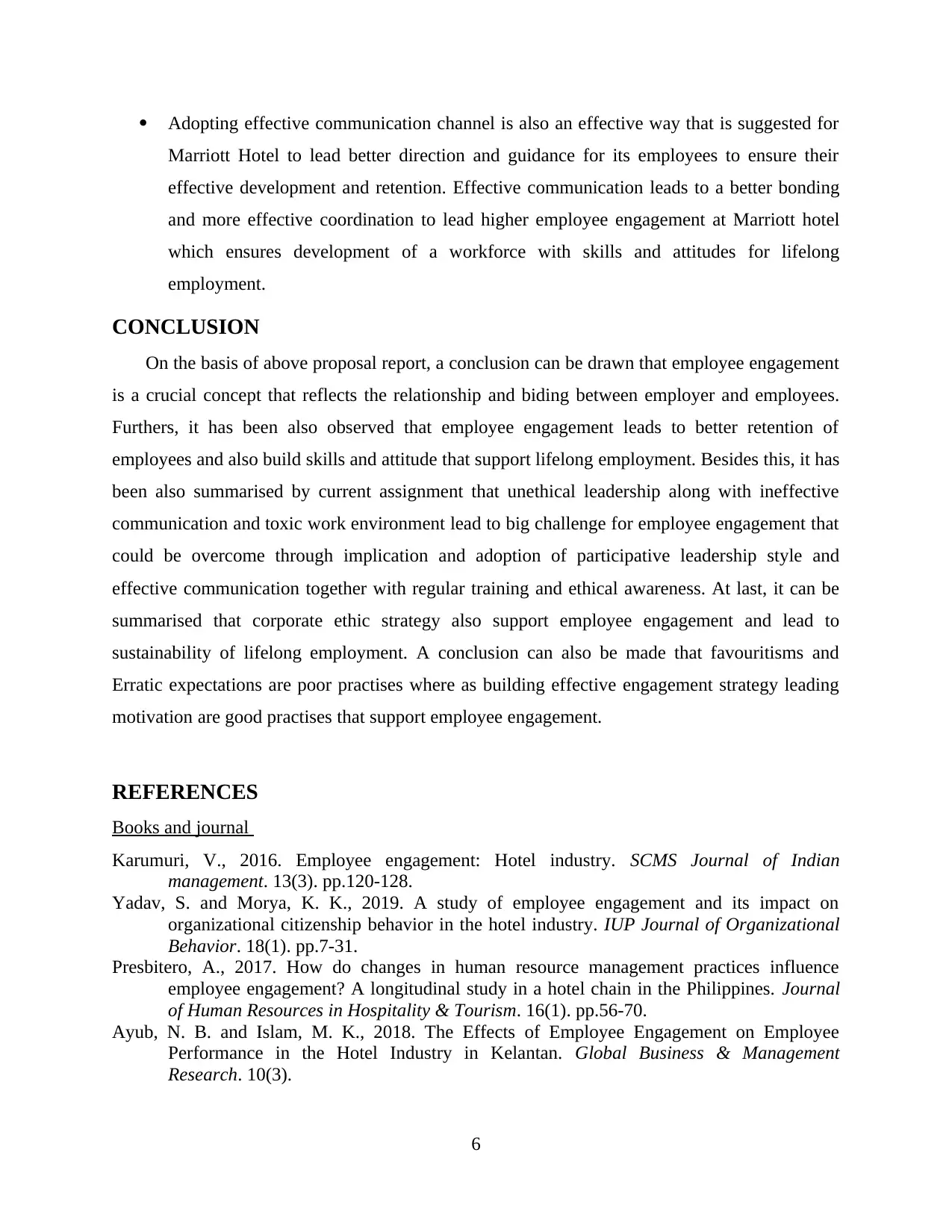
Adopting effective communication channel is also an effective way that is suggested for
Marriott Hotel to lead better direction and guidance for its employees to ensure their
effective development and retention. Effective communication leads to a better bonding
and more effective coordination to lead higher employee engagement at Marriott hotel
which ensures development of a workforce with skills and attitudes for lifelong
employment.
CONCLUSION
On the basis of above proposal report, a conclusion can be drawn that employee engagement
is a crucial concept that reflects the relationship and biding between employer and employees.
Furthers, it has been also observed that employee engagement leads to better retention of
employees and also build skills and attitude that support lifelong employment. Besides this, it has
been also summarised by current assignment that unethical leadership along with ineffective
communication and toxic work environment lead to big challenge for employee engagement that
could be overcome through implication and adoption of participative leadership style and
effective communication together with regular training and ethical awareness. At last, it can be
summarised that corporate ethic strategy also support employee engagement and lead to
sustainability of lifelong employment. A conclusion can also be made that favouritisms and
Erratic expectations are poor practises where as building effective engagement strategy leading
motivation are good practises that support employee engagement.
REFERENCES
Books and journal
Karumuri, V., 2016. Employee engagement: Hotel industry. SCMS Journal of Indian
management. 13(3). pp.120-128.
Yadav, S. and Morya, K. K., 2019. A study of employee engagement and its impact on
organizational citizenship behavior in the hotel industry. IUP Journal of Organizational
Behavior. 18(1). pp.7-31.
Presbitero, A., 2017. How do changes in human resource management practices influence
employee engagement? A longitudinal study in a hotel chain in the Philippines. Journal
of Human Resources in Hospitality & Tourism. 16(1). pp.56-70.
Ayub, N. B. and Islam, M. K., 2018. The Effects of Employee Engagement on Employee
Performance in the Hotel Industry in Kelantan. Global Business & Management
Research. 10(3).
6
Marriott Hotel to lead better direction and guidance for its employees to ensure their
effective development and retention. Effective communication leads to a better bonding
and more effective coordination to lead higher employee engagement at Marriott hotel
which ensures development of a workforce with skills and attitudes for lifelong
employment.
CONCLUSION
On the basis of above proposal report, a conclusion can be drawn that employee engagement
is a crucial concept that reflects the relationship and biding between employer and employees.
Furthers, it has been also observed that employee engagement leads to better retention of
employees and also build skills and attitude that support lifelong employment. Besides this, it has
been also summarised by current assignment that unethical leadership along with ineffective
communication and toxic work environment lead to big challenge for employee engagement that
could be overcome through implication and adoption of participative leadership style and
effective communication together with regular training and ethical awareness. At last, it can be
summarised that corporate ethic strategy also support employee engagement and lead to
sustainability of lifelong employment. A conclusion can also be made that favouritisms and
Erratic expectations are poor practises where as building effective engagement strategy leading
motivation are good practises that support employee engagement.
REFERENCES
Books and journal
Karumuri, V., 2016. Employee engagement: Hotel industry. SCMS Journal of Indian
management. 13(3). pp.120-128.
Yadav, S. and Morya, K. K., 2019. A study of employee engagement and its impact on
organizational citizenship behavior in the hotel industry. IUP Journal of Organizational
Behavior. 18(1). pp.7-31.
Presbitero, A., 2017. How do changes in human resource management practices influence
employee engagement? A longitudinal study in a hotel chain in the Philippines. Journal
of Human Resources in Hospitality & Tourism. 16(1). pp.56-70.
Ayub, N. B. and Islam, M. K., 2018. The Effects of Employee Engagement on Employee
Performance in the Hotel Industry in Kelantan. Global Business & Management
Research. 10(3).
6
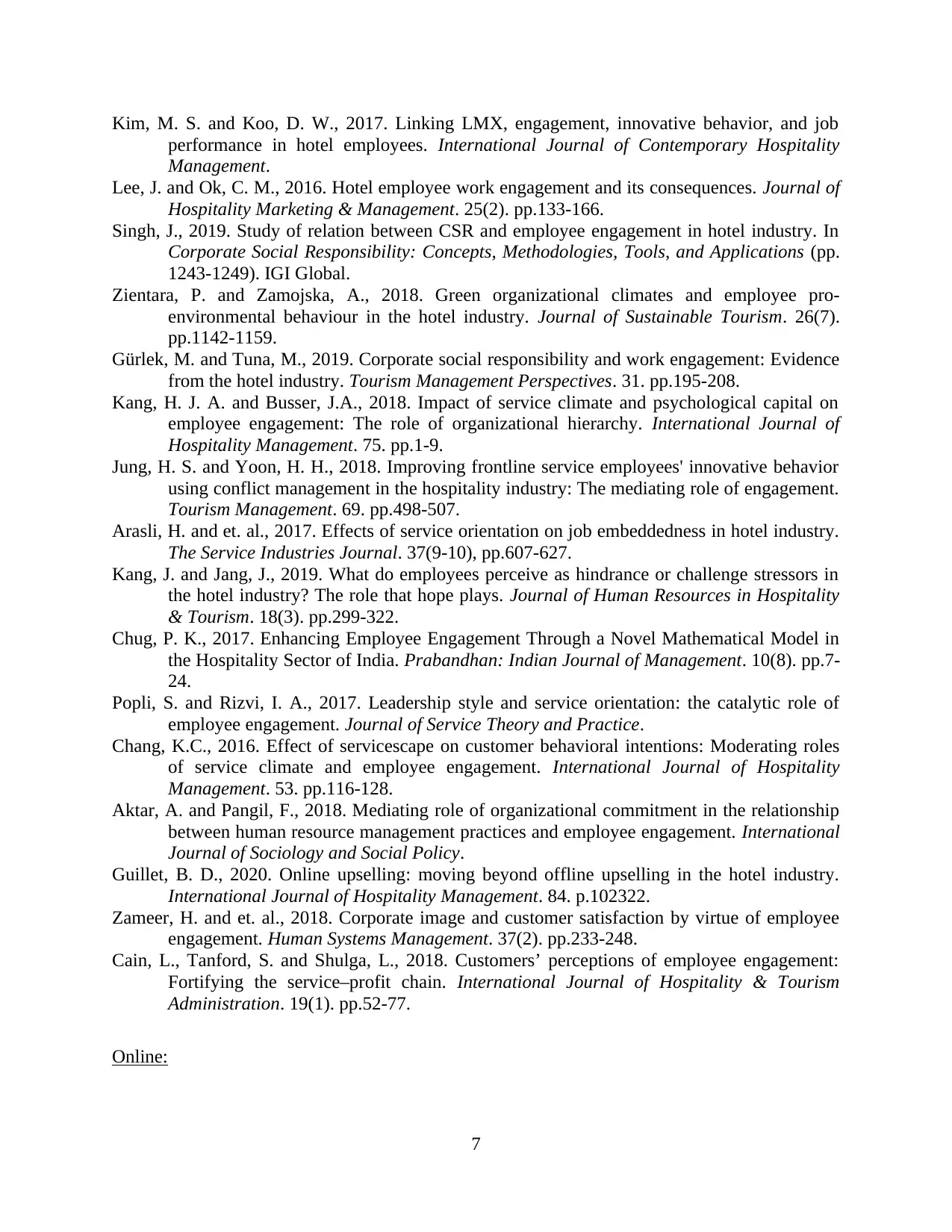
Kim, M. S. and Koo, D. W., 2017. Linking LMX, engagement, innovative behavior, and job
performance in hotel employees. International Journal of Contemporary Hospitality
Management.
Lee, J. and Ok, C. M., 2016. Hotel employee work engagement and its consequences. Journal of
Hospitality Marketing & Management. 25(2). pp.133-166.
Singh, J., 2019. Study of relation between CSR and employee engagement in hotel industry. In
Corporate Social Responsibility: Concepts, Methodologies, Tools, and Applications (pp.
1243-1249). IGI Global.
Zientara, P. and Zamojska, A., 2018. Green organizational climates and employee pro-
environmental behaviour in the hotel industry. Journal of Sustainable Tourism. 26(7).
pp.1142-1159.
Gürlek, M. and Tuna, M., 2019. Corporate social responsibility and work engagement: Evidence
from the hotel industry. Tourism Management Perspectives. 31. pp.195-208.
Kang, H. J. A. and Busser, J.A., 2018. Impact of service climate and psychological capital on
employee engagement: The role of organizational hierarchy. International Journal of
Hospitality Management. 75. pp.1-9.
Jung, H. S. and Yoon, H. H., 2018. Improving frontline service employees' innovative behavior
using conflict management in the hospitality industry: The mediating role of engagement.
Tourism Management. 69. pp.498-507.
Arasli, H. and et. al., 2017. Effects of service orientation on job embeddedness in hotel industry.
The Service Industries Journal. 37(9-10), pp.607-627.
Kang, J. and Jang, J., 2019. What do employees perceive as hindrance or challenge stressors in
the hotel industry? The role that hope plays. Journal of Human Resources in Hospitality
& Tourism. 18(3). pp.299-322.
Chug, P. K., 2017. Enhancing Employee Engagement Through a Novel Mathematical Model in
the Hospitality Sector of India. Prabandhan: Indian Journal of Management. 10(8). pp.7-
24.
Popli, S. and Rizvi, I. A., 2017. Leadership style and service orientation: the catalytic role of
employee engagement. Journal of Service Theory and Practice.
Chang, K.C., 2016. Effect of servicescape on customer behavioral intentions: Moderating roles
of service climate and employee engagement. International Journal of Hospitality
Management. 53. pp.116-128.
Aktar, A. and Pangil, F., 2018. Mediating role of organizational commitment in the relationship
between human resource management practices and employee engagement. International
Journal of Sociology and Social Policy.
Guillet, B. D., 2020. Online upselling: moving beyond offline upselling in the hotel industry.
International Journal of Hospitality Management. 84. p.102322.
Zameer, H. and et. al., 2018. Corporate image and customer satisfaction by virtue of employee
engagement. Human Systems Management. 37(2). pp.233-248.
Cain, L., Tanford, S. and Shulga, L., 2018. Customers’ perceptions of employee engagement:
Fortifying the service–profit chain. International Journal of Hospitality & Tourism
Administration. 19(1). pp.52-77.
Online:
7
performance in hotel employees. International Journal of Contemporary Hospitality
Management.
Lee, J. and Ok, C. M., 2016. Hotel employee work engagement and its consequences. Journal of
Hospitality Marketing & Management. 25(2). pp.133-166.
Singh, J., 2019. Study of relation between CSR and employee engagement in hotel industry. In
Corporate Social Responsibility: Concepts, Methodologies, Tools, and Applications (pp.
1243-1249). IGI Global.
Zientara, P. and Zamojska, A., 2018. Green organizational climates and employee pro-
environmental behaviour in the hotel industry. Journal of Sustainable Tourism. 26(7).
pp.1142-1159.
Gürlek, M. and Tuna, M., 2019. Corporate social responsibility and work engagement: Evidence
from the hotel industry. Tourism Management Perspectives. 31. pp.195-208.
Kang, H. J. A. and Busser, J.A., 2018. Impact of service climate and psychological capital on
employee engagement: The role of organizational hierarchy. International Journal of
Hospitality Management. 75. pp.1-9.
Jung, H. S. and Yoon, H. H., 2018. Improving frontline service employees' innovative behavior
using conflict management in the hospitality industry: The mediating role of engagement.
Tourism Management. 69. pp.498-507.
Arasli, H. and et. al., 2017. Effects of service orientation on job embeddedness in hotel industry.
The Service Industries Journal. 37(9-10), pp.607-627.
Kang, J. and Jang, J., 2019. What do employees perceive as hindrance or challenge stressors in
the hotel industry? The role that hope plays. Journal of Human Resources in Hospitality
& Tourism. 18(3). pp.299-322.
Chug, P. K., 2017. Enhancing Employee Engagement Through a Novel Mathematical Model in
the Hospitality Sector of India. Prabandhan: Indian Journal of Management. 10(8). pp.7-
24.
Popli, S. and Rizvi, I. A., 2017. Leadership style and service orientation: the catalytic role of
employee engagement. Journal of Service Theory and Practice.
Chang, K.C., 2016. Effect of servicescape on customer behavioral intentions: Moderating roles
of service climate and employee engagement. International Journal of Hospitality
Management. 53. pp.116-128.
Aktar, A. and Pangil, F., 2018. Mediating role of organizational commitment in the relationship
between human resource management practices and employee engagement. International
Journal of Sociology and Social Policy.
Guillet, B. D., 2020. Online upselling: moving beyond offline upselling in the hotel industry.
International Journal of Hospitality Management. 84. p.102322.
Zameer, H. and et. al., 2018. Corporate image and customer satisfaction by virtue of employee
engagement. Human Systems Management. 37(2). pp.233-248.
Cain, L., Tanford, S. and Shulga, L., 2018. Customers’ perceptions of employee engagement:
Fortifying the service–profit chain. International Journal of Hospitality & Tourism
Administration. 19(1). pp.52-77.
Online:
7
⊘ This is a preview!⊘
Do you want full access?
Subscribe today to unlock all pages.

Trusted by 1+ million students worldwide
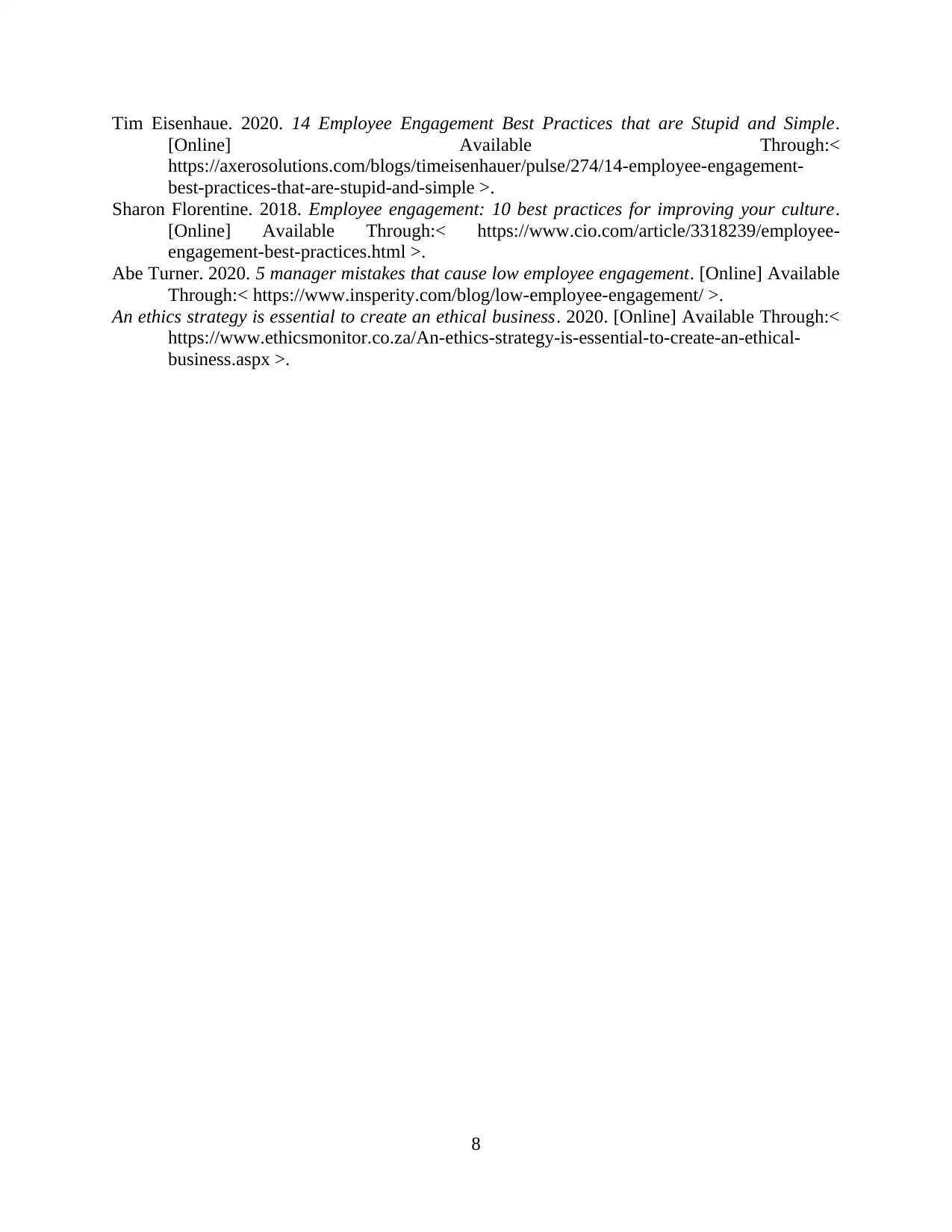
Tim Eisenhaue. 2020. 14 Employee Engagement Best Practices that are Stupid and Simple.
[Online] Available Through:<
https://axerosolutions.com/blogs/timeisenhauer/pulse/274/14-employee-engagement-
best-practices-that-are-stupid-and-simple >.
Sharon Florentine. 2018. Employee engagement: 10 best practices for improving your culture.
[Online] Available Through:< https://www.cio.com/article/3318239/employee-
engagement-best-practices.html >.
Abe Turner. 2020. 5 manager mistakes that cause low employee engagement. [Online] Available
Through:< https://www.insperity.com/blog/low-employee-engagement/ >.
An ethics strategy is essential to create an ethical business. 2020. [Online] Available Through:<
https://www.ethicsmonitor.co.za/An-ethics-strategy-is-essential-to-create-an-ethical-
business.aspx >.
8
[Online] Available Through:<
https://axerosolutions.com/blogs/timeisenhauer/pulse/274/14-employee-engagement-
best-practices-that-are-stupid-and-simple >.
Sharon Florentine. 2018. Employee engagement: 10 best practices for improving your culture.
[Online] Available Through:< https://www.cio.com/article/3318239/employee-
engagement-best-practices.html >.
Abe Turner. 2020. 5 manager mistakes that cause low employee engagement. [Online] Available
Through:< https://www.insperity.com/blog/low-employee-engagement/ >.
An ethics strategy is essential to create an ethical business. 2020. [Online] Available Through:<
https://www.ethicsmonitor.co.za/An-ethics-strategy-is-essential-to-create-an-ethical-
business.aspx >.
8
1 out of 10
Related Documents
Your All-in-One AI-Powered Toolkit for Academic Success.
+13062052269
info@desklib.com
Available 24*7 on WhatsApp / Email
![[object Object]](/_next/static/media/star-bottom.7253800d.svg)
Unlock your academic potential
Copyright © 2020–2026 A2Z Services. All Rights Reserved. Developed and managed by ZUCOL.





